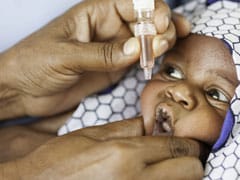While there is no cure, vaccination is the best way to prevent polio.

Vaccinating children helps break the chain of transmission
Polio, or poliomyelitis, is a highly infectious viral disease caused by the poliovirus. While many associate it only with paralysis, the virus can also infect children without causing any noticeable symptoms a condition known as asymptomatic polio. These individuals, despite not showing signs of illness, can still spread the virus, making them silent carriers and posing a risk to public health. While there is no cure, vaccination is the best way to prevent polio.
Understanding the importance of polio vaccine
Polio vaccination is the only effective way to prevent the disease, especially in children. Polio can present in three main forms:
- Asymptomatic infection - where the person shows no symptoms but can transmit the virus.
- Non-paralytic polio - symptoms may include fever, headache, vomiting, fatigue, stiffness in the neck, and pain in the limbs.
- Paralytic polio - the most severe form, resulting in permanent muscle weakness or paralysis, typically in the legs. Once paralysis occurs, there is no treatment that can reverse it. Physiotherapy may help improve mobility, but full recovery is rare.
As there is no cure for polio, prevention through vaccination is critical. The vaccine not only protects children from paralysis but also reduces the overall presence of the virus in the community.
Why polio vaccination is essential for the society
Vaccinating children helps break the chain of transmission. Since the poliovirus spreads via the fecal-oral route mainly through contaminated food and water and poor sanitation and hygiene can accelerate its spread. In communities with high vaccination coverage, the virus cannot find new hosts, effectively containing and eventually eradicating it. It's very important to not miss it so that our country remains Polio free (Polio was eradicated in March 2014)
Children are the most vulnerable group, particularly under the age of five. If polio re-emerges in a society due to low vaccination rates, it can hinder societal development, put public health systems under strain, and even paralyze productivity, especially in epidemics.
Types of polio vaccines and their role
There are two main types of polio vaccines:
- Oral Polio Vaccine (OPV): This is a live, attenuated vaccine given by mouth. It not only protects the vaccinated children but also helps build herd immunity by spreading to others through the stool, thereby exposing others to a weakened virus that triggers immunity.
- Inactivated Polio Vaccine (IPV): Given as an injection, this contains a killed version of the virus. It is safe, highly effective, and does not carry a risk of vaccine-derived polio.
During pulse immunization drives, it is crucial that every child under the age of five receives the vaccine. Parents must ensure they take their children to the nearest vaccination centre. Health officials often visit residential buildings to administer these doses. It's important not to skip the pulse polio dose, even if your child is already following the routine national immunization schedule. These additional doses are administered in response to suspected cases or potential threats in the community, and are essential to prevent the spread of infection and protect every child. Ring immunisation is when there is a suspected case and pulse immunisation is given irrespective of cases on a regular basis.
Recommended age and schedule for polio vaccination
The polio vaccination schedule typically includes a combination of OPV and IPV:
- At Birth: One dose of Oral Polio Vaccine.
- 6, 10, and 14 weeks: Injectable Inactivated Polio Vaccine (IPV) given at each of these intervals.
- Booster Dose: At 18 months of age.
- Additional Dose: In areas with poor hygiene or risk of outbreak, another dose may be given at 5 years of age.
By 18 months, a child should have completed the primary vaccination schedule. However, continued surveillance and booster doses, especially in high-risk areas, are vital to prevent any resurgence.
(Dr. Preetha Joshi, Consultant, Neonatal, Pediatric and Cardiac Intensivist, Kokilaben Dhriubhai Ambani Hospital, Mumbai)
Disclaimer: The opinions expressed within this article are the personal opinions of the author. NDTV is not responsible for the accuracy, completeness, suitability, or validity of any information on this article. All information is provided on an as-is basis. The information, facts or opinions appearing in the article do not reflect the views of NDTV and NDTV does not assume any responsibility or liability for the same.
DoctorNDTV is the one stop site for all your health needs providing the most credible health information, health news and tips with expert advice on healthy living, diet plans, informative videos etc. You can get the most relevant and accurate info you need about health problems like diabetes, cancer, pregnancy, HIV and AIDS, weight loss and many other lifestyle diseases. We have a panel of over 350 experts who help us develop content by giving their valuable inputs and bringing to us the latest in the world of healthcare.














